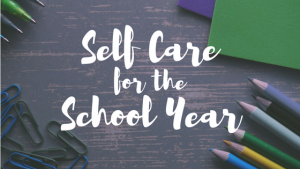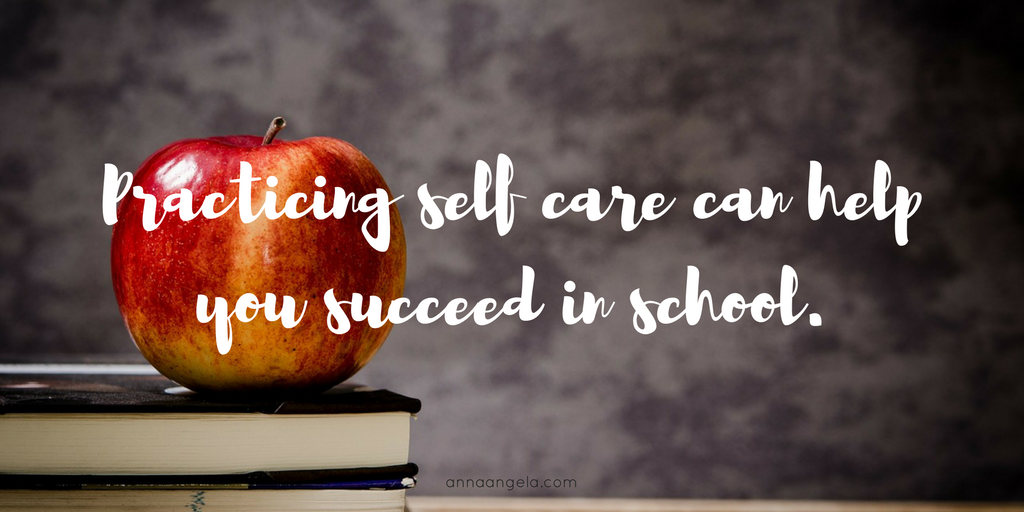I walked out of my dance class, feeling great and energized, when my eye started to twitch…quick and hard. While changing in a bathroom stall, I steadied my breath until the twitching stopped, and hightailed it to my next class. “Something’s wrong,” I kept telling myself, but my schedule didn’t permit me to figure out what. That was the semester I was taking 24 units from three different colleges. None of them were online so I was commuting Monday through Saturday.
I was stressed and on the verge of burnout.
Recently, my brother learned the same lesson I did in almost the same hard way I did. He took on way too much believing he could handle it, and paid the price for it with his health.
A lot of college students returned to school this week, and I cannot say enough how important it is to include self care throughout the school year.

A simple way of defining self care is taking care of yourself. When I was in college, I pretty much thought I was in relatively good health even though I was the sick child with really bad asthma and mild scoliosis. Even though my weight swung up and down and I got sick every flu season. I felt good. I took Tae Kwon Do and dance classes. I hiked up and the down the hilly campus. My grades were good. I got this. I can do more.
I’m good. Don’t worry about it. I can do it. Those are the can-do phrases that come out of every young person’s mouth, and for the most part…they’re true. For the most part, college students are pretty much supermen or women. It’s amazing what they juggle and accomplish.
But they’re only human. We are all only human. It’s unhealthy for us to go, go, go like the Energizer bunny. If we do, we’ll cross a line, crash, and burnout.
What that line looks like is different for every person, but it’s the difference between healthy stress and destructive stress. Unfortunately, that line is also very hard to spot. It’s hard to say what pushes us over the edge, what tips the scale, what sends us in a spiral, because it changes with the seasons of life we go through.
What we can see are the symptoms of crossing the line. It can be a twitch or tick. It can be hair loss, muscle spasms, body pains, or weight loss or gain. It can be a change of temperament, like a short temper, mood swings, or bouts of depression. These symptoms say, “You crossed the line. It’s too late. You’ve gone and did it.”
Practicing self care clues us in to where the line might be for the season of life we’re in. It forces us to slow down and listen to our bodies and inner lives. Unfortunately, slowing down is not usually the college way of life. The good news is there are easy ways to practice self care throughout the school year. There are easy ways to incorporate self care into the college life.

Weekly
Go outside. Fresh air really is good for the body, and a change of scenery can alter your attitude or give you much needed inspiration. Even if it’s only for a couple of hours every week, go outside. Read a book on a campus lawn. Exercise in a park. Study somewhere off campus.
Choose the healthy thing. Eat vegetables. Drink lots of water. Exercise. Take the stairs instead of the elevator. Walk or bike instead of driving. Sleep early. Even if you do one of these once a week, you’re building a healthy habit. It counts.
Monthly
Have fun with friends. Catch a game. Attend a social. See a movie. Do something bigger than coffee and smaller than throwing a party (because planning one can be stressful in itself). Blow off steam and release stress.
Review your finances. Make sure you don’t have outstanding fees, like with the library, your meal plan, or student body fees. Balance your accounts and set a budget. I know how stressful this can be, and self care is supposed to relieve stress. But if you ignore your finances, it can be a much greater source of stress in the long run. I’m not great with math, numbers, and finance. If you’re like me, ask help from someone who’s amazing at it. Don’t just ignore it.

Quarterly or Every Semester
Go home. If you can, visit the people who love and support you. Immerse yourself in community. Colleges can have bubbles around them. Burst that bubble and head into the real world. Connect. Interact. Live life.
Clear out your stuff. Cleaning is actually part of self care. At the end of the quarter or the semester, go through your things and throw out what you don’t need. It’s practical. You don’t amass junk and old notes. It’s symbolic for letting go of the past and moving forward, and for that reason, it’s also cathartic.
Every Year
Go to the doctor and dentist. Get your physicals and check-ups. Have your teeth cleaned. Stay on top of your health, and ask a lot of questions.
Use your breaks to take a break. Spring break, winter break, holidays, and summer vacation. Use them to actually take a break instead of taking more classes or picking up extra shifts at work. Some seasons of life will find you needing to take extra classes or work shifts, but if you’re not in that season, then use your breaks to take a break. Do nothing. Read a book for fun. Visit family. Couch surf with your friends or pitch in for an Airbnb in a city you road trip to.
Reevaluate your educational path. Amy Lynn Andrews wrote about a new way of approaching college. Instead of asking, “What’s my goal?” she asks a different question instead. Stop and reevaluate where you are and where you want to go. You would have changed a lot in a year. Reflect, and if needed, change your course.

Don’t neglect yourself this school year. Practicing self care can help you succeed.


